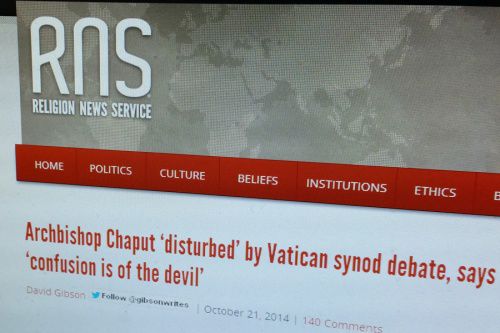Archbishop Charles J. Chaput of Philadelphia rejected claims that he had harshly criticized the Vatican or the recent synod, saying that he had instead been cautioning against a public image of the synod created by media reports that distort the truth.
“That's simply false,” Archbishop Chaput told CNA Oct. 24 about claims that he had “blasted” the recent Synod on the Family. “The synod isn't mentioned in my formal remarks, and what I said in answer to a question from the audience about the synod is easily available, in full, online. People can see or read for themselves.”
Archbishop Chaput’s comments followed a report by David Gibson of Religion News Service covering the archbishop’s Oct. 20 delivery of the 2014 Erasmus Lecture, hosted by the interreligious journal First Things. The lecture itself did not involve the synod, but focused on the role of religious believers in modern America.
After the lecture, an attendee asked Archbishop Chaput about the Synod on the Family, a global gathering of bishops that recently concluded in Rome, and the archbishop replied: “Well, first of all, I wasn’t there. That’s very significant, because to claim you know what really happened when you weren’t there is foolish. To get your information from the press is a mistake because they don’t know well enough how to understand it so they can tell people what happened.
"I don’t think the press deliberately distorts, they just don’t have any background to be able to evaluate things. In some cases they’re certainly the enemy and they want to distort the Church.
“Now, having said all that, I was very disturbed by what happened. I think confusion is of the devil, and I think the public image that came across was of confusion. Now, I don’t think that was the real thing there,” he said, adding that he is eager to hear from the U.S. bishops who were present at the event.
“I want to hear from them. Then you can ask me the question and I can give you a better answer,” he said. The archbishop then went on to say that “the Church has a clear position” on matters of marriage and communion, adding, “I’m not fundamentally worried because I believe the Holy Spirit guides the Church.”
In his reporting for Religion News Service, Gibson omitted the archbishop’s qualifying remarks about not presuming to know what really happened at the synod that he had not attended. He also omitted the archbishop’s comment that while confusion was the public image presented in the media, he did not think “that was the real thing” at the synod.
Gibson quoted Archbishop Chaput as saying, “I was very disturbed by what happened. I think confusion is of the devil, and I think the public image that came across was one of confusion.” He then moved on to other parts of the archbishop’s remarks.
The Religion News Service article was picked up by several other publications. Michael Sean Winters, a blogger for the National Catholic Reporter, pointed to Gibson’s article to argue that Archbishop Chaput was challenging Pope Francis, “criticizing the process of synodality,” and pushing an “agenda.”
Archbishop Chaput reiterated to CNA that when he had spoken of confusion being from the devil, he was not referring to the Vatican or the synod debates themselves, but to the way that the proceedings had been presented.
“The news media, sometimes innocently and sometimes not, distort the public image of the Church and her efforts. That creates confusion, including confusion in public perceptions of the synod, and there's nothing Godly about that,” he said. He lamented a sense of “infallibility” among some parts of the press, adding that “the worst offenders refuse to acknowledge their own mistakes and prejudices.”
Matthew Schmitz, deputy editor of First Things magazine, responded to Gibson’s article in an Oct. 23 blog post. He included both the video and written transcript of the archbishop’s comments.
Gibson’s article portrayed the archbishop as critical of the synod itself, Schmitz stressed, while “(i)n fact, Chaput denounced its public image while saying he would need to hear more from his brother bishops who actually attended before forming a firm opinion.”
Kenneth Gavin, a spokesman for the Archdiocese of Philadelphia, also voiced “grave concerns” about Gibson’s article, particularly its headline, which initially read, “Archbishop Chaput Blasts Vatican Debate on Family, says ‘Confusion is of the Devil’.” After the archdiocese contacted Religion News Service, the headline was changed to, “Archbishop Chaput ‘disturbed’ by Synod Debate, Says ‘Confusion is of the Devil’.”
Both of these headlines, however, inaccurately present Archbishop Chaput as being critical of the Vatican and the synod, Gavin said, when in reality, the archbishop was simply criticizing “those who used the draft report from the Synod out of context to reinforce their own opinions and agendas.”
Additionally, Gavin said, the focus that Gibson’s article places on the comments could lead the casual reader “to believe that the Archbishop’s talk was all about the Synod,” when his comments were actually in response to an audience question, and his lecture was not about the synod at all.
“The RNS piece that was published just isn’t an accurate reflection of reality. It mischaracterizes both Archbishop Chaput and what he said,” Gavin said. “The story has been picked up by secular and religious media at the national level and it has created a false and misleading image. That’s problematic and unfair. People have a right to the truth. Media have an obligation to present it.”

